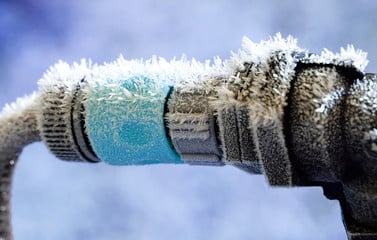Frozen pipes can be a nightmare for homeowners, causing water damage, plumbing repairs, and disruption to daily routines. As winter approaches, it’s important to take preventive measures to avoid the costly and inconvenient consequences of frozen pipes. In this blog post, we’ll discuss the science behind freezing pipes, the importance of pre-winter plumbing inspections, tips to prevent frozen pipes, emergency steps to take when pipes freeze, and the role of plumber Georgetown KY preventing frozen pipes. By following these tips, you can protect your home and plumbing system from the havoc of frozen pipes.
Understanding the Problem of Frozen Pipes
Before we delve into prevention strategies, it’s crucial to understand why frozen pipes are such a prevalent issue, especially during the winter months. When water freezes, it expands, increasing pressure within the pipes. Freezing typically starts from the outside walls of the pipes, where they are most exposed to cold temperatures. As ice forms inside the pipes, it restricts water flow, leading to blockages. The temperature threshold at which pipes freeze varies, depending on various factors such as insulation, building codes, and local climate conditions. Understanding the science behind freezing pipes is the key to effective prevention.

The Science Behind Freezing Pipes
When water inside a pipe freezes, it expands and increases pressure within the water line. This pressure buildup can lead to cracks, bursts, or other forms of damage to the pipe. The pressure can be so high that it causes the pipe to rupture, resulting in water leakage and potential water damage to the property.
During the freezing process, high pressure can build up inside the pipe, exerting tremendous force on the pipe walls. This pressure can cause weaker sections of the pipe to burst, leading to water leakages and potential flooding. For some DIY tips, you can FIX COMMON PLUMBING LEXINGTON KY PROBLEMS YOURSELF.
Why Frozen Pipes are a Homeowner’s Nightmare
Plumbing Repair
Dealing with frozen pipes can be a homeowner’s worst nightmare. When pipes freeze and subsequently burst, it often requires extensive plumbing repairs. This can involve replacing damaged sections of the pipe, repairing connections, or even replacing the entire plumbing system in severe cases.
Leak Repair
Frozen pipes can result in water leakage, requiring additional repair work to fix the leaks. Leaks can lead to water damage, mold growth, and structural problems if not addressed promptly.
Water Damage
One of the most significant concerns with frozen pipes is the potential for water damage to the property. Burst pipes can release gallons of water, flooding basements, walls, and other areas of the house. The water damage can be extensive, requiring costly repairs and resulting in the loss of personal belongings and sentimental items.
Preventive measures are crucial to avoid the nightmare of frozen pipes. By taking the necessary steps to prevent freezing, homeowners can save themselves from the stress, inconvenience, and expense of dealing with frozen pipes. Let’s explore some tips to help prevent frozen pipes this winter.
Pre-Winter Plumbing Inspection
Before the cold weather sets in, it’s essential to conduct a pre-winter plumbing inspection. Regular inspections can help identify potential issues, ensure the efficiency of plumbing systems, and mitigate the risk of unexpected breakdowns. By investing in preventive maintenance, homeowners can catch plumbing problems early, prevent frozen pipes, and save on costly repairs. Let’s delve into the importance of regular plumbing inspections, what to look for during an inspection, and why hiring a professional plumber Georgetown KY for inspection is crucial.
Importance of Regular Inspection
Regular plumbing inspections by a master plumber Georgetown KY are vital for maintaining the efficiency and functionality of plumbing systems. These inspections help identify any underlying problems, such as leak detection, water heater repair, or septic system maintenance, before they escalate into major plumbing emergencies. By addressing plumbing issues beforehand, homeowners can avoid significant disruptions and costly repairs. Regular inspections also ensure that plumbing systems meet safety standards and comply with building codes. By hiring a master plumber to perform regular inspections, homeowners can rest assured that their plumbing systems are in good hands.
What to Look for During an Inspection
During a plumbing inspection, professionals look for various signs of potential issues. Here’s what they typically look for:
- Corrosion or rust on pipes, fittings, or fixtures
- Proper functioning of faucets, toilets, and water heaters
- Insulation quality of pipes, especially in vulnerable areas
- Any leaks or drips in the plumbing system
- The condition of water heaters, sump pumps, and drain cleaning systems
- By inspecting these aspects, plumbers can identify potential problems and recommend appropriate preventive measures. Regular inspections can help homeowners avoid plumbing emergencies, improve the longevity of plumbing systems, and ensure a safe and reliable water supply.
Hiring a Professional for Inspection
When considering a professional for inspection, expertise plays a crucial role in ensuring a comprehensive check-up. Specialized tools used by professionals help uncover any hidden plumbing issues that may go unnoticed. Hiring an expert, such as one recommended by the Better Business Bureau, guarantees a thorough examination of all plumbing components, providing homeowners with peace of mind. Recommendations for preventive measures are tailored based on the findings from expert inspections, offering proactive solutions for potential plumbing concerns.
Tips to Prevent Frozen Pipes
Properly insulating pipes is crucial to prevent freezing. Implement safe heating measures to protect your plumbing. Consider using pipe sleeves and heating cables for added insulation. Additionally, letting faucets drip can help prevent freezing. By taking these precautions, you can minimize the risk of frozen pipes and potential water damage in your home.
Proper Insulation of Pipes
To prevent freezing, pipes can be insulated using foam sleeves. Extra insulation is crucial for pipes in attics, basements, and crawl spaces. Materials like fiberglass offer protection from freezing. Well-insulated pipes are less prone to bursting in freezing conditions. Adequate insulation plays a vital role in preventing frozen pipes.
Safe Heating Measures
To prevent freezing, utilize space heaters near exposed pipes and open kitchen and bathroom cabinets for warm air circulation around the pipes. Thaw frozen pipes safely by applying heat but avoid open flames or high heat sources near them. Implementing safe heating measures is crucial to prevent accidents and damage, ensuring the protection of your plumbing system.
The Role of Pipe Sleeves and Heating Cables
To prevent frozen pipes, pipe sleeves and heating cables act as crucial components. In colder regions, heating cables are essential to safeguard pipes, while pipe sleeves offer insulation, reducing heat loss. Combining both provides proactive protection against freezing pipes, potentially saving you from expensive repairs in the long run. The proper installation of these materials is key to ensuring the effectiveness of this preventive measure.
Dripping Faucets- A Solution?
Maintaining a slight trickle from faucets can prevent pipes from freezing by relieving pressure and promoting continuous water flow. This simple measure helps avoid pipe blockages, ice formation, and ensures water flow during cold weather.
Emergency Steps When Pipes Freeze
Thawing frozen pipes safely is crucial using methods like heating pads or towels. Calling plumber Georgetown KY for assistance is advisable.
How to Thaw Frozen Pipes Safely
Thawing frozen pipes safely involves applying heat from the faucet end and using tools like a hairdryer or heating pad for controlled thawing. To expedite the process, wrap pipes with hot water-soaked towels but avoid direct flames or blowtorches to prevent damage. Slow and safe thawing reduces the risk of bursting due to sudden temperature changes.
When to Call a Plumber for Frozen Pipes
If you’re struggling to pinpoint the frozen section in your pipes, it’s time to seek professional assistance. Contact a plumber immediately if you suspect any pipe damage or bursts. Expert plumbers possess the necessary tools and skills to safely thaw and fix frozen pipes. When multiple faucets show signs of freezing, a plumber’s intervention is crucial. Seeking help from a plumber promptly ensures a swift and effective resolution to the issue.
The Role of a Plumber in Preventing Frozen Pipes
A crucial aspect of preventing frozen pipes is the expertise and experience that a plumber brings. With services ranging from drain cleaning to plumbing repair, a master plumber ensures your plumbing system is in optimal condition. They navigate building codes and ensure all work meets regulations. Additionally, they can offer leak detection and water heater repair, addressing issues promptly to prevent further damage. By hiring a certified professional for plumbing work, including proper drainage, you can trust that your home’s water lines are well-maintained and protected according to local plumbing guidelines.
Expertise and Experience of a Plumber
With in-depth training and practical experience, plumbers handle a variety of plumbing issues effectively. Their expertise extends to preventing frozen pipes with tailored solutions and certification. Experienced plumbers, including project managers, assess each situation to recommend the most suitable preventive measures. When it comes to thawing frozen pipes, a plumber’s skill ensures a safe process without causing damage. Opting for a licensed and certified plumber guarantees top-notch work quality and reliable outcomes, providing peace of mind for homeowners.
Benefits of Hiring a Plumber for Winterizing Your Pipes
Ensuring adequate insulation for all vulnerable areas of your plumbing system, professional winterizing by a skilled plumber can prevent expensive repairs caused by frozen pipes. By entrusting this task to a plumber, you save time, effort, and the stress of dealing with potential plumbing disasters. Plumbers implement top-notch industry techniques to safeguard your pipes from freezing and bursting, offering you peace of mind that is truly priceless.
What Services Can a Plumber Offer to Prevent Frozen Pipes
To prevent frozen pipes, professional service providers offer various essential services. They can insulate exposed pipes effectively, shielding them from extreme cold. Installing pipe sleeves, heating cables, and heat tape are standard preventive measures. Expert plumbers are adept at identifying and sealing air leaks that contribute to pipe freezing. Routine maintenance involves thorough checks for potential freezing vulnerabilities, including inspecting and repairing heating and cooling systems. Additionally, plumbers can offer valuable advice on extra preventive steps to safeguard your pipes from freezing.
Conclusion
In conclusion, preventing frozen pipes is crucial to avoid costly repairs and damage to your home. By taking the necessary steps to insulate your pipes, implementing safe heating measures, and addressing any issues during a pre-winter plumbing inspection, you can significantly reduce the risk of frozen pipes. However, if you do encounter frozen pipes, it’s important to know how to safely thaw them and when to call a plumber for assistance. A professional plumber possesses the expertise and experience to help winterize your pipes effectively and provide services such as insulation, pipe sleeving, and heating cable installation. Don’t wait until it’s too late – take proactive measures to prevent frozen pipes today.
Protect your home from winter’s chill with Hubbard Mechanical’s 5 essential tips for preventing frozen pipes in Georgetown, KY. Empower yourself with practical knowledge and expert guidance to safeguard your plumbing system against freezing temperatures. Ensure a hassle-free winter and maintain your home’s plumbing integrity by implementing our preventative tips or scheduling a service with us for added peace of mind!
Frequently Asked Questions
How frequently should I have my plumbing inspected to prevent frozen pipes?
Plumbing inspections should be conducted annually, ideally before winter hits, to proactively address any potential issues. Regular maintenance aids in detecting and resolving leaks or insulation issues. Engaging a professional plumber for thorough inspections can ensure your plumbing system is winter-ready.
How do you fix a pipe that keeps freezing?
To address a pipe that keeps freezing, insulate it with foam or heating tape, maintain warmth around it, allow a slight faucet drip to prevent pressure, and thaw using a hairdryer or heat lamp if frozen.


Recent Comments